Please join me in welcoming Elisa Wilson as a guest blogger today as she gives you a glimpse into her life as a pattern designer. Share your favourite beginner’s quilting tip for a chance to win a free pattern and template of your choice.
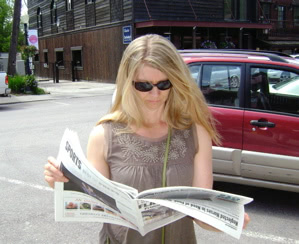
I have a secret life. Most of my friends and acquaintances don’t know what I do. When I meet someone for the first time, this is how the conversation goes:
Them: "Do you work?"
Me: "Yes, I have a business. I design quilts and produce patterns and acrylic templates for quilters."
Them: Blank stare, long pause. "Oh, you make quilts."
Me: "No, I make patterns and sell them to quilters who make the quilts."
Them: "Who buys them?"
Me: "Well, I sell mostly to quilt shops across the US and to distributors who sell to quilt shops."
Then another person walks up and Them introduces me: "This lady makes quilts."
Me: Sigh. "Yes, I make quilts."
For a pattern designer, life revolves around market (it is a BIG deal for us). International Quilt Market is held twice a year. In the spring it moves around to different locations and in the fall it is always in Houston. At market you will find many different pattern designers, fabric companies, publishers of magazines and quilt books, thread companies, sewing machine manufacturers and much more.
Market is about what is NEW. It is your chance to show everyone your newest creations. Immediately after market is over, you have to start on the new NEW and have it ready in time for the next market.
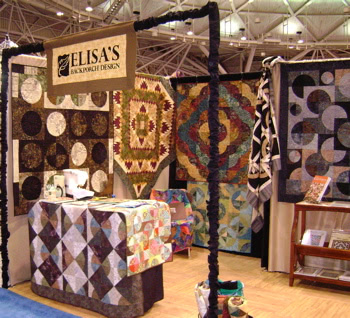
So what do I really do all day?
After my breakfast and morning workout I am on the computer. Computer work takes up the majority of my day. I am sending emails, posting blogs, marketing, taking online classes, designing, writing patterns and coordinating with graphic designers, printers and shop owners. Some days I even get to sew!
I truly enjoy the design the process. This is how it usually goes:
First, I receive fabric from one of the fabric companies I work with.
Then I sort through the fabric. This time there are about 30 different colors. Immediately I pull out any fabric that does not appeal to me. Fortunately there are only about 6 I do not like in this bunch. The rest definitely speak to me.
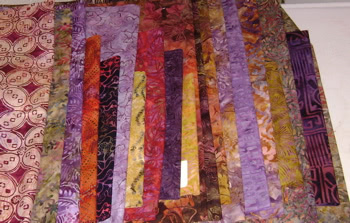
Next I divide the fabric into colors. I make piles of colors that seem to be the same (greens in one pile, yellows in another, etc.). Then I re-divide the fabric into lights, mediums, and darks. I re-arrange it many times.
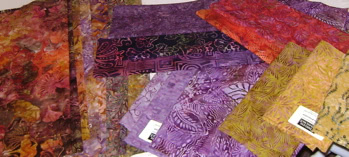
I am handling the fabric, getting familiar with the colors and patterns. I usually let it sit on the dining room table and look at it during the day. Depending upon the deadline it can sit there for a few days or a few weeks.
I begin to get a few ideas and then I go to my EQ (Electric Quilt) and play around with different blocks.
Will this be an easy pattern or something more complicated? How many fabrics do I need to use? Does it have to be a certain size? Will I be producing the pattern or am I writing it for a fabric company? Playing on EQ can take days.
Once I have a few ideas I begin to make test blocks. It is surprising that what looks good on EQ does not always translate to good in fabric. I sew a few test blocks, try a different fabric, arrange the blocks, go back to EQ, re-arrange the blocks.
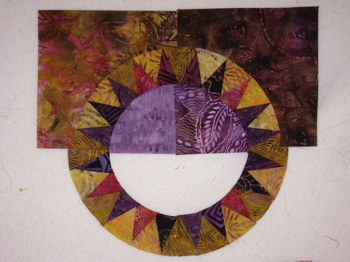
Then I write down how to make the blocks. Make a few more blocks to see if my instructions really make sense. A lot of back and forth goes on. More questions: Is it a good pattern? Is it different? Does it showcase the fabric? Who will this appeal to? Is it too boring or too challenging?
Every quilt needs a name. My husband is super good at coming up with names. He writes down a bunch of names, just letting his imagination go and writing anything that comes to mind. We can get a good chuckle during the word play on names.
After the quilt top is made I have to quilt and bind it. I love the quilting but dislike the binding. I then send it off to the photographer to get its picture taken for the pattern cover. While the photographer is working, I’m writing the pattern instructions. The pattern is proof read and tested. As soon as I get the quilt photo, the graphic designer and I create the pattern cover. The instructions and cover design are sent to the printer. Everything is printed and assembled into bags.
Whew! That’s a lot of work. I usually have three or four patterns going on in different stages at one time. I work about 40 hours a week and I juggle a lot of hats.
So my secret life is out. Are you surprised? How does it sound to you? Is it what you thought it would be? I would love to hear your comments and questions.
I invite you to join me as I chronicle my life as as a designer and my adventures in the awesome Montana wilderness that is my home at Seams Sew Crazy or on Facebook. Visit my online shop, Elisa’s Backporch Design, to see my patterns, templates and video tutorials.
Give-Away
I am offering a drawing for a free pattern and template of your choice. Anybody who makes a comment is entered.

To enter the give-away: Leave a comment below sharing your favourite beginner’s quilting tip. Give-away ends September 8, 2010. Winner will be chosen randomly.
This contest is now closed. Congrats to #61 Brigitte!
Please continue to share your favourite quilting tips. These are awesome!
The best advice I got when I started quilting was to make the quilts I like and try to have fun while doing it. Be precise in cutting and sewing were other great advices I got.
Lotta in Sweden
I love your quilt designs! You actually make it sound quite easy and fun. I have tried writing instructions and find it very hard! I have been a tester for new patterns for a friend of mine and am envious of those with such talent! Keep up the great work!
When you need to construct several pieces into a quilt block and you want several of the same blocks…. strip piece in steps to make sure blocks all are going in the same direction! Ask me how I learned this… LOL
Always make a test block to check the directions, and if you make it in related fabrics – all repros, or all Christmas fabrics – eventually you will have enough blocks for a quilt!
A wonderful picture into the designers world. I have a friend trying to break into that world. I will send your article on to her! My tip, read the pattern all the way through, and when you’re done, read it through again!!
My best advice is to take any project one step at a time so the entirety of the project doesn’t overwhelm you! thanks for the chance to win!
Pay attention to detail as you go. If you measure components as you go, when you assemble all components into a block and ultimately a quilt top, you’ll be much happier with the results. It’s much easier to fix something at a component stage than a whole block or quilt top stage.
Hi Elisa! Love your patterns and interested to hear your process (isn’t it surprising how much computer time is involved in the “design” process?!).
My favourite beginner quilter’s tip is to take a class and learn proper techniques from the start which will help point you on the path of quilting success.
My best beginner’s tip would be, “Don’t stress yourself out!” Quilting is supposed to be fun & relaxing. We all strive to cut and sew our patchwork perfectly but when you make mistakes take a deep breath and remember there is no quilt police out there looking for you! :o) Thanks for the opportunity.
Thank you for a look in your life. I have been thinking of becoming a pattern designer. Now I have a better idea of the steps you take to achieve your creative process. I’m good at following the lead of others, but freeze when I try and think of one on my own. I think I’ll try your process with my stash and see what I come up with!
Wow, impressive! My fav tip is that you can finger press seams with your nail and can iron later.
Wow, love this interview….and love the quilts featured here. A new pattern is always fun so I hope I win :) My best quilting tid-bit…..have fun and enjoy!
My best tip is to be open minded about methods and tips. It is hard to sway someone who ALWAYS adheres to the rule to “press to the darker colored fabric”. Other ideas work in different applications. My best advice though is to “have fun quilting”.
Great interview and since I am new to quilting my tip would be – Love your iron. It will become your best friend :)
I need all the help I can get…tfs.
I always use this advice, don’t let anyone tell you it is wrong, if you are enjoying yourself and your method is working, then do it, break the rules.
It sounds like a lot of work to me but I think you are doing a great shop for us.
I visit Houston festival a lot of times and see (and bought) a lot of patterns but never release how much work it is to create just one pattern.
Thank for doing this for quilters all over the world!
Carla,
The Netherlands
Press as you go is my beginner advice. I find it helps to make things line up. Thanks for a great giveaway.
Great description of the life of a pattern designer. I’ve admired your work for a long time…it’s always beautiful. My favorite beginners tip: Start small, preferably in a class and give away your first project to someone you love. They won’t see the “learning” mistakes and won’t care a bit if your seams are a little bit off. Then make another one for yourself. Most of all…enjoy yourself. Life is short; quilt what you love.
wow, great insight into how designers actually work, love the photos and the fabric is awesome! a great tip I use often is about binding. when cutting fabric for a quilt project, i also cut the binding strips at the same time and prep them, then wind on a bath tissue or paper towel tube and they are at the ready when the quilting is done….i use this tip all the time, then i store the leftovers on the tube for future projects, again ready when i need them…
My best beginner’s tip – wow. How to pick only 1? When you are going to work with any kind of piecing that involves diagonal cuts, like in triangles, if you lightly starch the fabric BEFORE you begin cutting, you’ll reduce the amount of bias stretching and it will help your accuracy.
My neighbor, Donna, helped me make my first quilt, a Trip Around the World. She helped me pick the fabrics and worked with me through every step. I think the biggest lesson I learned from her was accuracy – I unsewed several seams on that first quilt, but it was so much better for it! I’ll never forget my friend Donna and all she instilled in me!
The best beginning tip would be to perfect the 1/4 inch seam. After that all else will fall into place.
I loved reading how you explain your job and their interpretaion.
Elisa… so nice to ‘meet’ you… I have just retired my pattern business. I love the designing part.. handling the fabric…the whole ‘9 yards’.. no pun intended.
I certainly am wishing you every success.
Great article!
My favorite beginners tip is to get a great seamripper that is super sharp, and has a skinny point and a wide handle that feels good in your hand. You will be using it, you might as well make the chore as painless as possible. Oh, and the seam ripper can and will get dull, so plan on replacing it ‘just because’ and not ‘when I lost it’.
hello Elisa i have some of your books and patterns and just enjoy them,Elisa thank you for beening on quiltertv.com i have learned so much from watching you there bless you for makimg our quilt patterns.nellie
I always stress to my new students to make sure to always close the rotary cutter EVERY time they put it down esp if they have children or pets in the house. Some stitches (medical!) could have been avoided had this advise been heeded. ;)
The best quilting advice I ever got was measure twice, cut once.
I like to keep my sewing area tidy so I have a small rolling lint remover in my sewing box. Just a quick roll across my cutting mat or floor to pick up those stray threads. Also, great for removing cat hair, when your family pet decides to sit on your fabrics as you are sewing!
My beginner tip is to join a local guild. The members are a wealth of experience and they often have workshops or mini teaching sessions. Kathie L in Allentown
I think my best suggestion is to try and keep your seams as accurate as possible. The blocks go together so much smoother. Also, don;t forget to have fun and enjoy the process!
It sounds like a lot of work to me but I think you are doing a great shop for us.
I visit Houston festival a lot of times and see (and bought) a lot of patterns but never release how much work it is to create just one pattern.
Thank for doing this for quilters all over the world!
Carla,
The Netherlands
my tip……have fun, don’t stressed with every little thing…..it’s learning process that goes on and on……..you can always learn new things even if you ‘ve been sewing since the beginning of time(you know back with the dinosaurs!!! lol=!!)
Use good thread. And decent quality fabric. You will be glad you did, lol.
measure twice, cut once…
and
always start at the beginning of the directions…lol
What a great job!
My tip would be to try to buy fabric you like — don’t buy ugly fabric just because you find it on sale!
I first became acquainting with Elisa through some videos on QNN years ago. I appreciate her direct teaching style. My suggestion for quilters is to remember that even the simplest designs can be stunning with good use of color and contrast.
Beautiful patterns! Would love to win one!
My tip is to measure twice and cut once! One of the things I was always doing when I first started quilting was thinking I had the right measurements but being off just a little bit. It can throw the whole block off if you don’t measure correctly!
Don’t pick anything too hard to start with. If the pattern’s too complicated, you end up getting discouraged and put it into the “too hard basket”. Choose a simple and easy pattern and enjoy yourself.
My best tip for a beginning quilter is to work on accurate quarter inch seams. Thank you for this great give-away. Take care and God bless, Cory
Love the International quilt festival! It is such an inspiring place to be! My best tip for beginners is start small and work up to a Large bed size quilt.
My favorite tip is not to worry, and keep the seam ripper handy.
My tip is that a quilter does not need the most expensive sewing machine with all the bells and whistles, they need one that will sew a straight seam. Love your interview, people think it is so simple to design,–not. Keep up the good work.
I loved reading about what you do. Thank you. I’ll pass along what my first quilting teacher told me. Take as many classes/workshops as you can. You always come away with at least one really good new technique, tip, etc.
am the worst quilter ever, but am learning. I have been looking for some easy and simple patterns i hope i get lucky.
LOVE the part about “blank pause, long stare” — and the automatic assumption that you make quilts! I’m a longarm quilter, and people think I “make quilts” too! Funny how it can feel that we are speaking a foreign language at times… LOVE your patterns too!
I enjoyed that! My best advice….enjoy the process. Too many people just want to get to the end in a hurry. I tried to teach a friend to sew and she would just shove the fabric through the machine. I couldn’t get her to understand that your job is to guide the fabric. She wanted the end result and didn’t want to wait for it.
Thank you for sharing your information. It sounds like fun. I create original sewing patterns but haven’t created any quilt patterns. My best advice for beginners is to find fabric that you love and can see a quilt in it’s future. Buy quality. That doesn’t necessarily mean you have to spend a lot of money. Fall in love with your iron and spray starch. I am new to quilting, so this is what I’ve found out, so far.
Love your blogs, Elisa, and your templates and patterns! I have used one of them for four years as the best beginner quilting pattern for my beginner students.
My tip is: Make the seam ripper your friend, and never leave an especially badly sewn seam in your quilt. However, little mistakes in your first quilt will remind you how much you’ve improved as you progress.
Great article. Thanks for sharing your secret life with us! My favourite beginner tip would be to just start. You will learn all of the other tips once you begin. It’s so gratifying to have a quilt you’ve made yourself. Making a perfect 1/4 inch seam when patchworking would be my next tip. That one becomes pretty obvious – pretty fast! You won’t learn until you DO – so begin! Thanks for the chance.